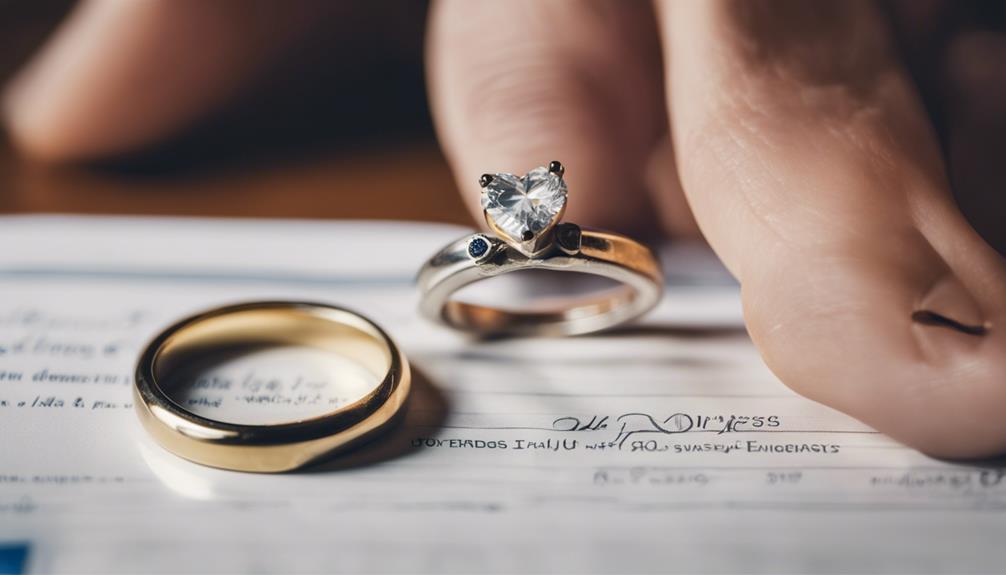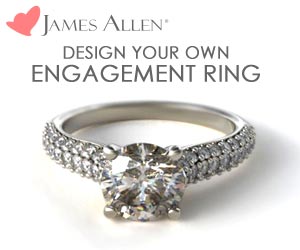You usually have to give the engagement ring back if the engagement is called off, as it’s often seen as a conditional gift based on the promise of marriage. Who initiated the breakup or who’s at fault can affect this decision, and local laws vary widely. In some states, you must return the ring regardless of circumstances, while in others, fault matters. For clear guidance, check your state’s specific regulations or consult a legal expert. To uncover more details about how different states handle these situations, stick around for an in-depth look.
Legal Ownership of Engagement Rings

Understanding the legal ownership of engagement rings can be complex. In many jurisdictions, engagement rings are classified as conditional gifts. This means if you break the engagement, you’re generally expected to return the ring. The premise here is simple: the ring is given with the expectation of marriage. When that condition isn’t met, the giver usually retains legal ownership.
However, the rules aren’t uniform across all states. For instance, in Montana, engagement rings are viewed as unconditional gifts. In such places, you’d get to keep the ring regardless of the engagement’s outcome. Legal ownership, consequently, depends considerably on local statutes.
The circumstances surrounding a broken engagement also matter. Some states consider who’s at fault when determining whether you must return the ring. If the breakup was due to the giver’s actions, courts might let you keep the ring. Conversely, if you initiated the breakup, you might be required to return the ring.
Given these variations, it’s essential to consult local laws and possibly seek legal advice to understand your rights fully. Legal ownership of engagement rings is a nuanced topic, heavily influenced by jurisdiction and specific breakup scenarios.
Conditional Vs. Unconditional Gifts
When it comes to engagement rings, the classification between conditional and unconditional gifts plays an important role in determining who keeps the ring if the engagement ends.
Typically, an engagement ring is viewed as a conditional gift. This means its ownership is contingent upon the marriage taking place. If the marriage doesn’t occur, the recipient is generally expected to return the engagement ring to the giver.
In most jurisdictions, the understanding is clear: since the ring is given with the intent of a forthcoming marriage, it must be returned if that promise is broken.
However, there are exceptions. For instance, states like Montana classify engagement rings as unconditional gifts. In such states, the recipient keeps the ring even if the engagement is broken.
Understanding whether you’re dealing with a conditional or unconditional gift is vital. While most U.S. states treat engagement rings as conditional gifts, meaning you should return the engagement ring if the engagement ends, it’s wise to consult legal advice specific to your jurisdiction.
This guarantees you’re clear on your rights and responsibilities, avoiding potential disputes over the ring in the event of broken engagements.
Impact of Breakup Circumstances

Breakup circumstances frequently play a crucial role in determining who keeps the engagement ring. Engagement ring laws vary, but many jurisdictions follow the conditional gift approach. This means if the marriage doesn’t happen, the ring should be returned.
However, the specifics can get tricky depending on who ended the engagement. In some states, the person who broke off the engagement is required to return the ring. For example, Colorado mandates that if you gave the ring and then ended the engagement, you should get the ring back.
Other places follow a fault-based approach, where the reasons for the breakup are considered. If your partner was at fault, you might be entitled to keep the ring. Conversely, no-fault states like Florida make it simpler by generally requiring the ring to be returned to the purchaser, regardless of who ended the engagement.
Courts often rely on past legal precedents and specific state laws to decide these disputes. Understanding the engagement ring laws in your state can provide clarity on who keeps the ring, as emotional factors can complicate the decision. Legal advice can also help navigate these complex scenarios.
State-Specific Laws
State-specific laws greatly affect who keeps the engagement ring after a breakup. In most states, an engagement ring is considered a conditional gift, meaning you must return the ring if the marriage doesn’t happen. However, the specifics can vary widely depending on where you live.
For instance, in Montana, engagement rings are seen as unconditional gifts. This means you can keep the ring regardless of whether the wedding takes place.
In contrast, states like Florida and Massachusetts consider fault in ownership disputes. If you end the engagement without just cause, you’re expected to return the ring.
New Jersey takes a different approach by requiring the ring to be returned to the giver, making fault irrelevant. States like Arkansas and Kentucky also favor the giver, allowing them to reclaim the ring no matter what caused the breakup.
Meanwhile, Alaska and Mississippi enforce a no-fault rule, which means you must return the ring regardless of who initiated the breakup.
Understanding these state laws can help you navigate the emotional and legal complexities surrounding an engagement ring when the wedding is called off. Knowing your state’s stance on conditional gifts is essential to resolving ownership disputes amicably.
Seeking Legal Advice

Consulting a family law attorney is an important step if you’re unsure about whether you need to return an engagement ring after a breakup. Laws about engagement ring ownership can be complex and vary greatly from state to state. By seeking legal advice, you can gain a clear understanding of the legal implications surrounding your specific situation.
A family law attorney can clarify whether your engagement ring is considered a conditional gift, which often means you must return it if the marriage doesn’t happen, or an unconditional gift, allowing you to keep it regardless of the breakup. Understanding this classification is vital in determining your obligations.
Additionally, an attorney can help navigate any disputes that arise, especially if the reasons for ending the engagement are contentious. They can provide insight into how emotional factors might influence the legal outcome and guarantee that you’re making informed decisions.
Legal resources, such as FindLaw.com, can help you find a qualified family law attorney knowledgeable about local engagement ring laws. Before deciding to keep or return the ring, seeking legal advice can prevent future disputes and confirm you’re acting within the law.
Conclusion
In the midst of your heartbreak, don’t rush your decision about the engagement ring. Whether you have to give it back hinges on legal specifics and the breakup’s context. Laws vary widely, so seek legal advice to understand your rights. Consider the emotional impact on both you and your ex-partner. Balancing legal clarity with your feelings will guide you through this tough choice. Remember, you’re not alone, and help is available to navigate this challenging time.



